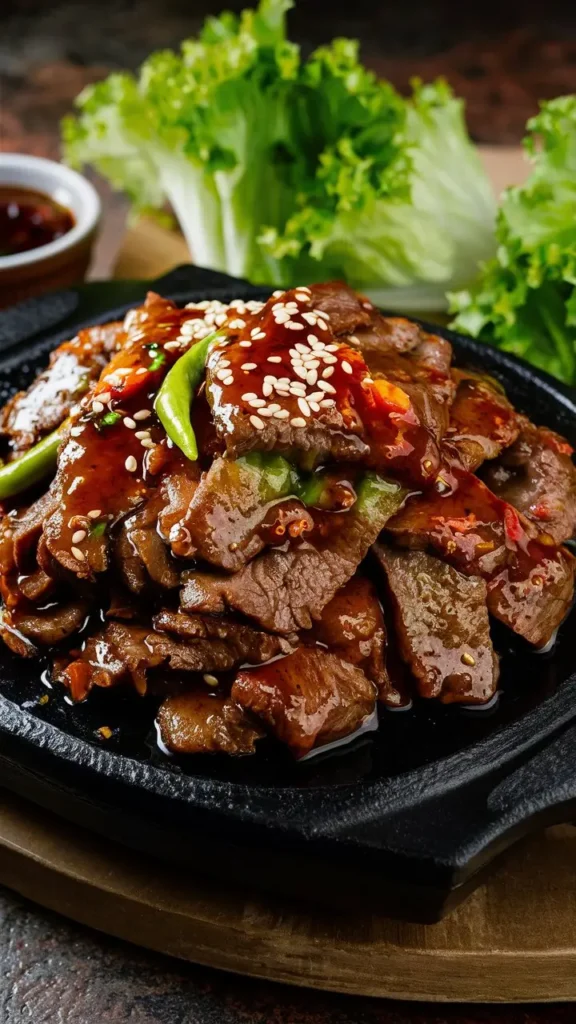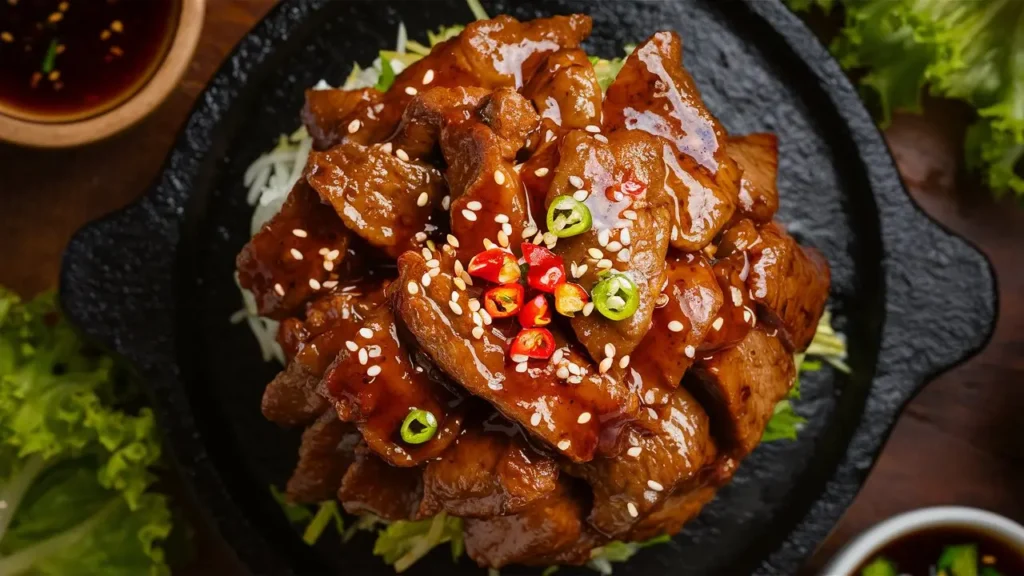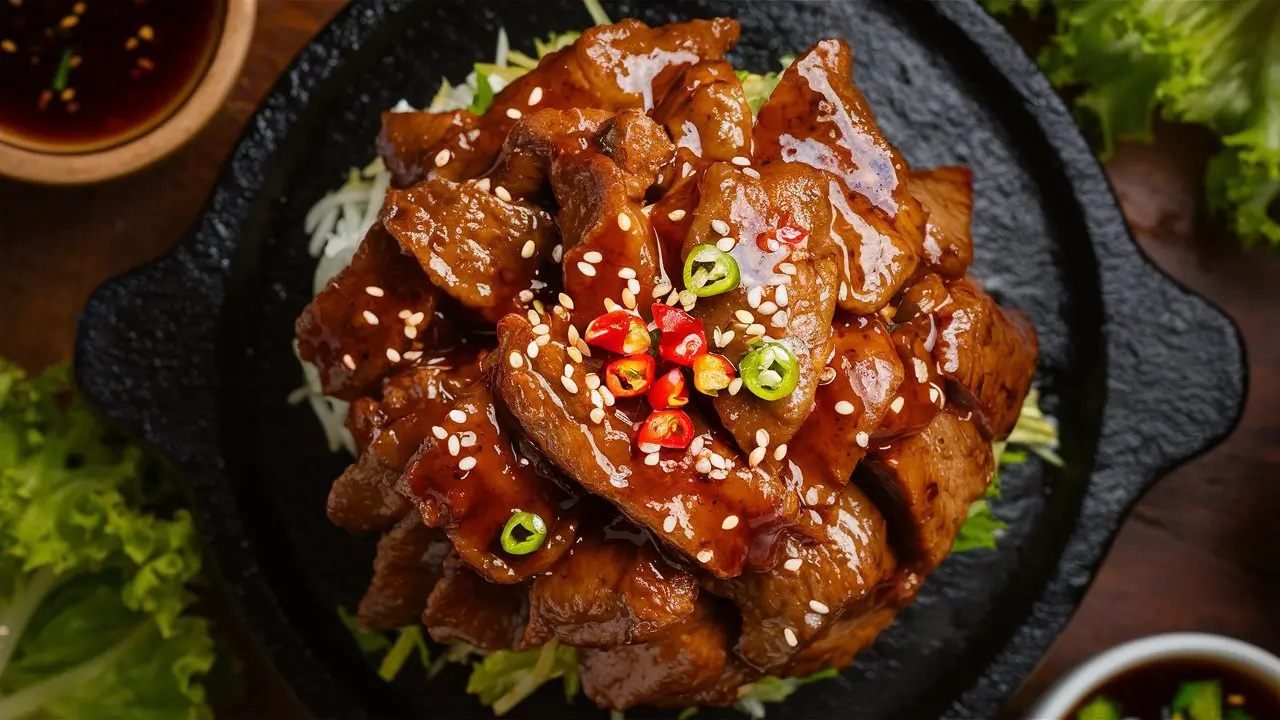Korean beef, commonly known as Bulgogi (meaning “fire meat”), is a flavorful and savory dish that’s deeply rooted in Korean culinary tradition. Thin slices of beef are marinated in a sweet and savory sauce made with soy sauce, sugar, sesame oil, garlic, and other seasonings before being grilled, pan-fried, or stir-fried to perfection.
Whether served over a bed of steamed rice, wrapped in lettuce leaves, or paired with traditional Korean sides like kimchi, this dish is a showstopper in both flavor and simplicity. In this recipe, we’ll explore a homemade version of Korean beef that’s easy, customizable, and absolutely delicious.

Why You Will Love This Recipe
-
Quick and Easy This Korean beef recipe comes together in under 30 minutes, making it perfect for weeknight dinners.
-
Loaded with Flavor The marinade is sweet, savory, garlicky, and slightly nutty—packed with umami in every bite.
-
Budget-Friendly You don’t need expensive cuts of meat. Ground beef or thinly sliced flank steak works great.
-
Versatile Serve it over rice, in lettuce wraps, or in tacos for a Korean-Mexican fusion twist.
Ingredients List
Here are the ingredients you’ll need for a classic Korean beef dish:
For the Beef:
-
1 pound ground beef or thinly sliced flank steak
-
1 tablespoon vegetable oil (if using sliced beef)
For the Marinade:
-
1/4 cup soy sauce (low-sodium preferred)
-
2 tablespoons brown sugar
-
1 tablespoon sesame oil
-
3 cloves garlic, minced
-
1 teaspoon fresh ginger, grated
-
1/2 teaspoon crushed red pepper flakes (optional)
-
2 green onions, finely chopped
-
1 tablespoon rice vinegar or mirin (optional for tang)
-
1/2 teaspoon ground black pepper
For Serving:
-
Cooked white rice or brown rice
-
Sesame seeds
-
Extra chopped green onions
-
Lettuce leaves (optional)
-
Kimchi or other Korean side dishes (optional)
Timing & Servings
-
Prep Time: 10 minutes
-
Cook Time: 15 minutes
-
Total Time: 25 minutes
-
Servings: 4
Step-by-Step Instructions for Korean Beef
Step 1: Prepare the Marinade
In a bowl, whisk together the soy sauce, brown sugar, sesame oil, garlic, ginger, red pepper flakes (if using), green onions, and rice vinegar. Set aside.
Step 2: Cook the Beef
If you’re using ground beef, heat a skillet over medium-high heat and cook the beef until no longer pink, breaking it apart as it cooks. Drain excess fat if necessary.
If using sliced beef, heat oil in a skillet, add the beef, and sear quickly on high heat until browned.
Step 3: Add the Marinade
Pour the marinade into the skillet with the cooked beef. Stir to coat all the meat evenly. Simmer for 5–7 minutes until the sauce thickens slightly and is absorbed.
Step 4: Finish and Serve
Serve the Korean beef hot over steamed rice. Garnish with sesame seeds and extra green onions. Add a side of kimchi or wrap the beef in lettuce for a low-carb version.

Choosing the Right Cut of Beef
Ground Beef
Affordable and easy to cook, ground beef makes this dish accessible and quick without sacrificing flavor.
Flank or Sirloin Steak
For a more authentic experience, thinly slice flank or sirloin steak across the grain. Freeze it for 15 minutes beforehand to make slicing easier.
Ribeye
For special occasions, ribeye adds extra tenderness and richness but is pricier.
Tips for the Best Korean Beef
-
Marinate in Advance: If using sliced beef, marinate for 30 minutes to overnight for deeper flavor.
-
Don’t Overcook: Sliced beef cooks fast. High heat and short cooking time help retain juiciness.
-
Adjust Sweetness: Add or reduce sugar based on your taste preferences.
-
Add Vegetables: Stir in sliced bell peppers, carrots, or zucchini for added nutrition and color.
Make It Spicy
If you enjoy heat, add:
-
Extra red pepper flakes
-
A spoonful of gochujang (Korean fermented chili paste)
-
A few drops of sriracha for a fusion twist
Serving Suggestions
Traditional Style
-
Serve over a bowl of steamed rice with sesame seeds and chopped scallions.
-
Add kimchi, pickled radish, or Korean cucumber salad on the side.
Lettuce Wraps
Use butter lettuce or romaine to wrap spoonfuls of Korean beef. Add a touch of rice, kimchi, and a sprinkle of sesame seeds for a fresh, low-carb option.
Fusion Style
-
Korean Beef Tacos: Add beef to tortillas with shredded cabbage and a drizzle of sriracha mayo.
-
Korean Beef Bowls: Build a bowl with rice, sautéed spinach, shredded carrots, and a fried egg on top.
Storing and Reheating
-
Refrigerator: Store leftovers in an airtight container for up to 4 days.
-
Freezer: Freeze cooked Korean beef for up to 2 months.
-
Reheat: Warm in a skillet over low heat or in the microwave. Add a splash of water if the sauce has thickened too much.
Make-Ahead Tips
-
Prepare the marinade and store it in the fridge for up to 5 days.
-
Cooked beef can be made in advance and reheated just before serving.
Korean Beef Variations
Korean Beef and Broccoli
Add steamed or stir-fried broccoli for a one-pan meal similar to beef and broccoli stir-fry.
Korean Beef Stir Fry
Throw in chopped bell peppers, snap peas, or mushrooms for a complete stir-fry dish.
Korean Beef Rice Bowls
Layer rice, beef, sautéed spinach, shredded carrots, cucumbers, and a soft-boiled egg for a satisfying rice bowl.
Nutritional Information (Approximate per serving)
-
Calories: 360
-
Protein: 22g
-
Fat: 20g
-
Carbohydrates: 18g
-
Sugar: 10g
-
Fiber: 1g
-
Sodium: 700mg
Values vary depending on ingredients and serving style.
FAQs
Can I use ground turkey instead of beef?
Yes, ground turkey or chicken works well and makes the dish lighter.
Is Korean beef gluten-free?
Use tamari or a certified gluten-free soy sauce to make it gluten-free.
How long should I marinate sliced beef?
At least 30 minutes, but up to overnight for best flavor.
Can I double the recipe?
Absolutely. It scales well for meal prep or feeding a crowd.
What is the best side dish with Korean beef?
Kimchi, pickled vegetables, or a cucumber salad complement the rich beef flavor perfectly.
Can I make this recipe vegetarian?
You can use crumbled tofu, tempeh, or even lentils with the same marinade for a plant-based version.
Conclusion
Korean beef is a flavorful, versatile, and incredibly satisfying dish that delivers bold umami-rich flavors with minimal effort. Whether you’re enjoying it in a traditional rice bowl, wrapped in lettuce, or exploring fusion options like tacos or stir-fries, this recipe brings Korean comfort food right into your kitchen.
With easy-to-find ingredients, fast cooking time, and a variety of serving possibilities, Korean beef is a weeknight winner and a crowd favorite. Once you try it, it might just become a regular on your dinner rotation.
